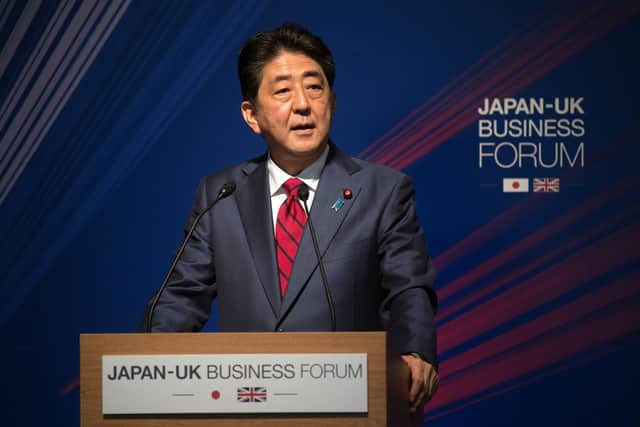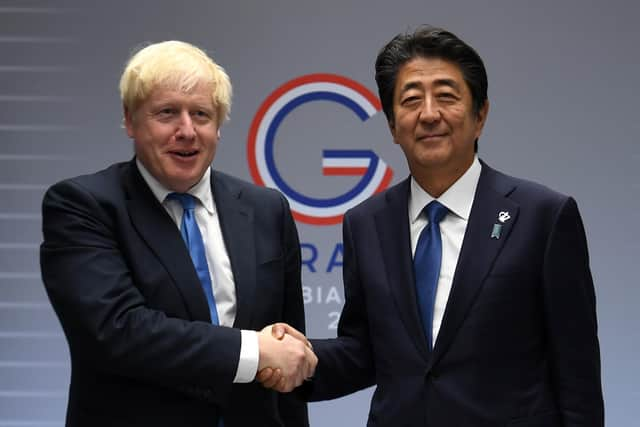Shinzo Abe news: Shinzo Abe shot in Japan - who was former Prime Minister and stalwart of Japanese politics?
The former PM was credited with bringing a degree of stability to Japan following a period of economic malaise.
Mr Abe, 67, was shot from behind during a campaign speech in western Japan on Friday and later died in hospital.
Advertisement
Hide AdAdvertisement
Hide AdPolice arrested the suspected gunman at the scene of the attack, which shocked people in a country known as one of the world’s safest.
We look at the details around the story and the life of Shinzo Abe.
Shinzo Abe shot
Mr Abe was shot from behind minutes after he started his speech on Friday in Nara in western Japan.
He was airlifted to a hospital for emergency treatment but was not breathing and his heart had stopped.


Nara Medical University A&E chief Hidetada Fukushima said Mr Abe suffered major damage to his heart in addition to two neck wounds that damaged an artery, causing extensive bleeding.
He never regained his vital signs, Mr Fukushima said.
Mr Abe’s treatment included large blood transfusions.
The 67-year-old was pronounced dead later at the hospital.


Who was Shinzo Abe?
Born into a prominent political family, Shinzo Abe was the country’s longest-serving prime minister.
While credited with bringing a degree of stability to Japan following a period of economic malaise, Mr Abe angered neighbours South Korea and China – along with many Japanese people – with his nationalistic rhetoric and calls to revise the country’s pacifist constitution.
He was born on September 21,1954 in Tokyo, the son of Shintaro Abe, who served as Japan’s foreign minister, and grandson of Nobusuke Kishi, a former prime minister.
Advertisement
Hide AdAdvertisement
Hide AdIn 1977 he graduated Seikei University in Tokyo with a degree in political science, after which he moved to the US to study public policy at the University of Southern California for three semesters.
In 1979 he started work at Kobe Steel before leaving the company three years later to pursue new positions at the foreign ministry and with the ruling Liberal Democratic Party.
In 1993 he was first elected as a LDP legislator representing the south-western prefecture of Yamaguchi.
In 2005 he was appointed chief cabinet secretary under then-prime minister Junichiro Koizumi, during which he led negotiations to return Japanese citizens abducted to North Korea. The same year, he is elected head of the LDP, putting him in line to take over as prime minister.
On September 26, 2006 he was elected as Japan’s prime minister for the first time, overseeing economic reforms while taking a hard line on North Korea and seeking to engage with South Korea and China.
His stay was short lived however following electoral defeats that saw the LDP lose control of the legislature for the first time in 52 years later on that year with Mr Abe resigning as prime minister, citing health reasons. He had been suffering from ulcerative colitis but was able to control it with medication.
in 2012, after again being elected LDP president, Mr Abe became prime minister for the second time and launched his “Abenomics” policies featuring easy lending and structural reforms in a bid to boost growth. Japan’s relations with China underwent a particularly rough patch initially but started to improve after Mr Abe met with Chinese leader Xi Jinping at the APEC summit in Beijing.
In 2014, he was re-elected leader of the LDP serving two additional terms as prime minister for a total of four, while developing close relations with then-US president Donald Trump, with the pair holding summits and playing golf together.
Advertisement
Hide AdAdvertisement
Hide AdIn August 2020, he announced he would step down as prime minister, again citing health reasons, after his ulcerative colitis flared up again. By that point, Mr Abe had already become Japan’s longest-serving prime minister.
In 2021, Mr Abe riled Beijing with comments on Taiwan, the self-governing island China claims as its own territory. In a speech, Mr Abe warned that “military adventure would lead to economic suicide”.
Have there been arrests after shooting of Prime Minister Abe?
Police arrested the suspected gunman at the scene of the attack but no motive is yet known.
Nara prefectural police confirmed the arrest of Tetsuya Yamagami, 41, on suspicion of attempted murder.
Social media footage shows security guards leaping on top of a man in a grey shirt who lies face down on the pavement shortly after the shooting.
Opposition leaders condemned the attack as a challenge to Japan’s democracy with the Prime Minister Fumio Kishada saying the government planned to review the security situation, but added that Mr Abe had the highest protection.
Tributes paid to Shinzo Abe
Former Japanese prime minister Shinzo Abe will be remembered for his “global leadership through unchartered times” following his “incredibly sad” death, Boris Johnson has said.
Mr Johnson tweeted: “Incredibly sad news about Shinzo Abe.
“His global leadership through unchartered times will be remembered by many. My thoughts are with his family, friends and the Japanese people.
“The UK stands with you at this dark and sad time.”
Advertisement
Hide AdAdvertisement
Hide AdFormer prime minister Theresa May, who won the backing of Shinzo Abe for her Brexit deal after talks in the UK in January 2019, said the death of her friend was “truly heartbreaking”.
She tweeted: “Truly heartbreaking to hear of the death of my friend Shinzo Abe, former prime minister of Japan — killed in the most appalling of circumstances while campaigning for his political party.
“He was a statesman of the highest calibre. A dependable partner and trusted ally. A consummate host. But also the warmest and kindest of friends.
“My prayers and deepest sympathies are with his family and the people of Japan.”
Chancellor Nadhim Zahawi said the news was “heart-breaking”.
“We enter politics to serve and to try and make the world a better place,” he tweeted.
“Shinzo Abe has lost his life in pursuit of that noble aim. May he rest in eternal peace.”
Before his death was confirmed, Foreign Secretary Liz Truss said she was “devastated” by the shooting.
Advertisement
Hide AdAdvertisement
Hide AdShe tweeted: “Devastated to hear about the attack on former Prime Minister Abe. We stand with our Japanese friends at this difficult time.
“Our thoughts and prayers are with his family and friends.”
Labour leader Sir Keir Starmer had earlier called it a “dark day”.
He tweeted: “Our hearts are with the family of Shinzo Abe and the Japanese people.
“A truly dark day.
Ireland’s foreign affairs minister has described Shinzo Abe as a “significant and popular” global political figure.
Simon Coveney tweeted: “Such shocking and sad news that former prime minister of Japan Shinzo Abe has died following an attack.
“Our thoughts are with all Japanese people at this very sad time.
“He was a significant and popular global political figure. Rest in Peace.”
Tony Blair, the long-serving Labour Prime Minister, also worked with and met Mr Abe in the final years of time in Downing Street.
Advertisement
Hide AdAdvertisement
Hide AdOn Friday, he called Mr Abe a “leader and statesman of extraordinary quality and character”.
“I knew him and worked with him and always had huge respect for his capability.
“I am shocked and saddened by his senseless murder.
“I send my deepest condolences to his wife Akie, with whom my wife Cherie also worked closely, and to all the people of Japan.”
